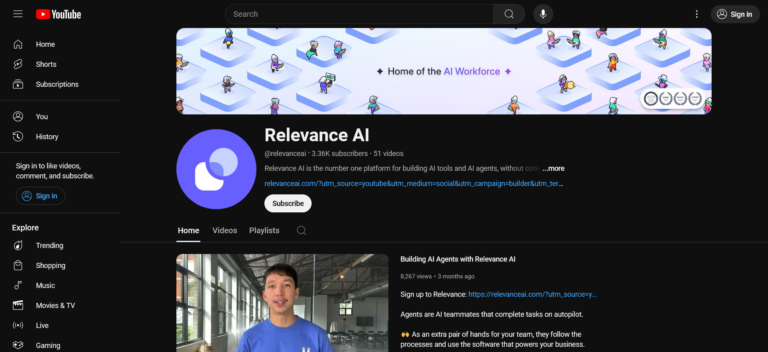How to Perform A/B Testing for Personalized Emails with Relevance AI
Relevance.ai
Absolutely incredible! Relevance.ai’s Agents are a true game-changer for any team looking to automate workflows and enhance productivity. These AI teammates handle tasks on autopilot, becoming an extra pair of…
Key Take-aways
- A/B Testing with AI: Relevance AI can automate A/B testing for personalized transactional emails using dynamic tools and agents that interact with Stripe and Zapier.
- Personalized Email Generation: AI agents can generate and send both long-form and short-form emails, enhancing customer engagement by tailoring content based on research and UTM tracking.
- AI Tools for Email Marketing: Tools like Relevance AI’s Google Search and text extraction can be combined to conduct research and personalize outreach, making marketing automation more effective.
In this tutorial, Dan from Relevance AI demonstrates how to create an A/B test for personalized transactional emails using AI agents. This step-by-step guide explores how AI agents can generate different email styles, integrate with Stripe via Zapier, and perform A/B tests based on user interactions.
Using Relevance AI for A/B Testing
Relevance AI’s A/B testing capability allows for real-time experimentation with email marketing strategies:
- Integrating Stripe, Zapier, and Relevance AI: The process begins with a payment made in Stripe, which triggers an event in Zapier. This event sends the payment details to Relevance AI, where an AI agent extracts customer information, conducts research, and generates personalized emails.
- Example: In the demonstration, a fake payment of $50 triggers the AI agent, which extracts the customer’s email, name, and company. It then performs a Google search to gather additional context before generating and sending a personalized welcome email.
- A/B Testing for Email Variants: Relevance AI’s agent alternates between sending long, styled HTML emails and short, plain text emails. This A/B testing approach allows marketers to analyze which format is more effective by tracking clicks via UTM parameters.
- Example: The AI agent randomly chooses between the two email styles, sending either a longer HTML email with images and buttons or a concise text-only email.
What are A/B Testing, Tools, and Agents in Relevance AI?
Relevance AI’s platform enables dynamic A/B testing, offering a variety of AI tools and agents to support marketing experiments:
- A/B Testing with AI: A/B testing involves comparing two versions of an email to see which performs better. Relevance AI’s agents can manage this process by alternating between email formats and tracking results through UTM codes.
- Examples: The long HTML email includes visually appealing elements like images, buttons, and sections, while the short text email focuses on brevity and simplicity.
- AI Tools in Relevance AI: AI tools perform specific tasks, such as web scraping, text extraction, or Google searches. These tools are designed for consistent outputs and deterministic workflows.
- Examples: Relevance AI’s Google Search tool conducts searches based on user inputs, while the text extraction tool pulls relevant data from URLs.
- AI Agents in Relevance AI: Agents act as decision-makers, coordinating tools to perform complex tasks. In this A/B testing scenario, the AI agent decides which email style to send and manages the personalization process.
- Examples: The AI agent uses a combination of research tools, text generation, and conditional logic to personalize emails based on gathered information.
Building A/B Tests with Relevance AI: Best Practices
Dan shares several strategies for setting up effective A/B tests using Relevance AI:
- Setting Up A/B Testing:
- Email Variants: Create both long-form and short-form email templates in the Relevance AI platform. Use different prompt engineering techniques for each variant to ensure distinct outputs.
- Random Selection Mechanism: Implement a Python code step that randomly assigns a value of 0 or 1, determining which email variant to send for each customer interaction.
- Example from Relevance AI: In the tutorial, the AI agent uses conditional logic to select between the long or short email based on the output of the Python code step.
- Personalization with AI Tools:
- Researching Customers: Use AI tools to research customer details based on email addresses. For example, the AI agent performs Google searches and extracts relevant information to tailor the email content.
- Adding UTM Parameters: Integrate UTM codes into email links to track the performance of each variant. Use different UTM parameters for long-form and short-form emails to measure engagement accurately.
- Example from Relevance AI: The AI agent automatically adds UTM parameters, such as “utm_campaign=long_email” or “utm_campaign=short_email,” to links in the emails.
Debugging Strategies for AI-Driven A/B Tests
Debugging AI-driven A/B tests requires a systematic approach. Dan outlines the following techniques:
- Testing Inputs and Outputs: When testing AI tools and agents, use realistic inputs to simulate actual user behavior. This helps ensure that the AI behaves as expected during live scenarios.
- Example: Dan used a test payment from Stripe, allowing the AI agent to perform a complete end-to-end test, including research, email generation, and personalization.
- Modular Design: Build tools with single, specific tasks to simplify debugging. For instance, separate tools for Google searches and text extraction allow for clearer identification of errors.
- Example: The Relevance AI agent uses distinct tools for each step in the process, making it easier to identify which tool might be causing issues.
- Conditional Logic in A/B Testing: Implement conditional logic to manage the flow of tasks in AI agents. This ensures that agents make decisions based on task requirements and available data.
- Example: The Python code step determines whether the AI agent generates a long or short email, maintaining a balanced distribution for the A/B test.
Top Use Cases for AI-Driven A/B Testing
AI-driven A/B testing can be applied across various industries to enhance marketing efforts:
- E-commerce Marketing: Use AI agents to personalize transactional emails, test different promotional offers, and track engagement rates.
- Customer Onboarding: Implement A/B tests for welcome emails, optimizing for factors like length, tone, and content based on user responses.
- Lead Nurturing: AI agents can test different email sequences to identify which approach leads to higher conversion rates.
Analyzing AI-Driven A/B Testing Results
While AI-driven A/B testing offers powerful insights, it also presents unique challenges:
- Tracking Engagement: Using UTM codes in links allows marketers to track user interactions, providing clear data on which email variant performs better.
- Personalization vs. Standardization: AI agents can balance personalization with consistent messaging, ensuring that users receive tailored yet reliable communication.
- Iterative Testing: Continuously refine email prompts, templates, and tracking mechanisms to improve results and increase conversion rates over time.
Monetization Strategies for AI-Driven A/B Testing
Businesses can leverage AI-driven A/B testing in several ways:
- Subscription-Based Marketing Automation: Offer A/B testing as part of a subscription service, enabling users to optimize emails based on real-time data.
- Consulting for Personalized Marketing: Provide consulting services to help businesses implement AI-driven A/B testing, focusing on customer segmentation and personalized content strategies.
- Training Courses on AI Marketing: Develop training programs that teach marketers how to use AI agents for A/B testing, integrating platforms like Relevance AI into their workflows.
Is AI-Driven A/B Testing Right for Your Business?
AI-driven A/B testing offers a powerful way to personalize marketing efforts, improve engagement, and optimize conversion rates. By using tools and agents effectively, businesses can automate the testing process, gather valuable insights, and refine their marketing strategies.
Relevance AI’s platform makes it easy to set up A/B tests, personalize emails, and track results in real-time. Whether you’re new to AI-driven marketing or looking to enhance your existing strategies, integrating AI tools and agents can transform your approach.
Ready to explore AI-driven A/B testing? Discover how Relevance AI can help you create personalized, scalable marketing solutions today.

